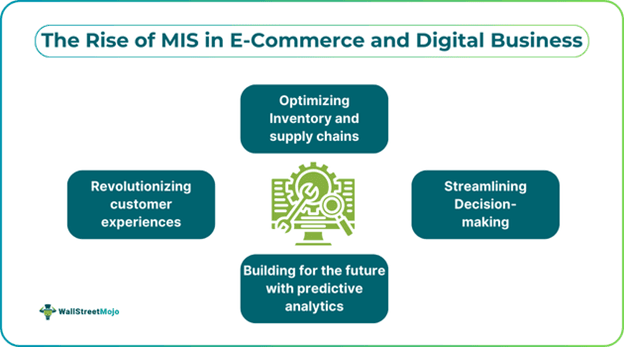The Rise Of MIS In E-Commerce And Digital Business
Table of Contents
Introduction
Management information systems refer to structured systems that involve accumulating and storing data of a business and then distributing the information to the management team. Using a management information system or MIS, businesses can track customer activity and their preferences and study their purchasing patterns. Additionally, it enables companies to create well-targeted marketing campaigns and improve their customer service and tech support.

Today, in this article we will try to understand why there is a sudden rise of MIS in E-commerce and digital businesses.
What Is MIS, and Why Should You Care?
Management information systems are a framework that collects information from multiple sources in a business enterprise, such as employees, processes, documents, inventories, transactions, and figures from reports. It then analyzes it to offer tailor-made information and insightful data to managers and their staff. Using an MIS helps managers and management make improved, data-driven decisions. A key benefit of using an MIS is that it provides businesses a competitive edge with accurate data and well-analyzed information. Generally, the more complicated a business’s operations, the more complicated its MIS will possibly be.
MIS is readily used across all types of businesses. For instance, a grocery store may use a computer database to keep track of inventory and bestselling goods and improve strategic planning. Similarly, a music store can use a database to record key data concerning the sale of its CDs online and make better business decisions. Now to answer why you should care about it is not only the present but the future of information management. If you are using traditional methods to track information and maintain records manually, you are wasting a lot of time and energy without knowing the power of MIS.
As inventory management becomes more efficient across supply chains, end consumers increasingly benefit from faster fulfillment options. Services like Shipt now enable same-day grocery delivery, reflecting how real-time inventory systems support timely access to everyday essentials without requiring a trip to the store.
Why Study Management Information Systems?
When an individual decides to study management information systems, they open doors to numerous opportunities allowing them to gain valuable information and knowledge. Indeed, by studying MIS, they get exposure to accounting and management principles and receive hands-on experience in project management, software programming, and database design.
Per the United States Bureau of Labor Statistics. MIS jobs are set to rise by 15% across different business units and industry segments between 2022 and 2032. Hence, with a practical understanding of MIS gained through a certification or a MIS bachelor degree, individuals unlock can possibilities of career development in different fields, ranging from business to technology.
How Does MIS Transform E-Commerce and Digital Businesses?
Let us look at the different ways in which MIS is positively impacting digital and e-commerce businesses.
#1 - Revolutionizing Customer Experiences
MIS in e-commerce has brought a significant shift in the way businesses interact and communicate with their customers. Not just customers but other parties, including potential customers and the target audience. MIS leverages technology and offers faster, personalized and efficient service to its customers. Through MIS, real-time communication becomes possible. The whole framework automates routine tasks and assists with key insights into studying customer behavior and preferences.
By implementing an effective MIS in e-commerce, businesses can bring in digital business transformation, reduce customer-related costs, streamline internal processes and create a balance between manual and automated tasks, resulting in a compelling customer experience. Integrating simple order management software into the MIS framework can further enhance efficiency by automating order processing and tracking. Additionally, integrating a search intelligence solution within MIS enables businesses to refine how customers discover products, ensuring more relevant and precise search results that enhance engagement and conversions.
#2 - Optimizing Inventory and Supply Chains
With the effective use of MIS, any store, factory or production facility can ensure that they have the right amount of inventory at their disposal. MIS helps in effective inventory management by allowing businesses to track raw materials and maintain a record of the stock levels, which then eventually helps in eliminating issues such as stockouts, overstocking, and backorders. This creates a positive domino effect and helps in reducing logistics costs and cultivating an efficient supply chain management system.
#3 - Streamlining Decision-Making Like a Boss
With MIS in e-commerce, most of the routine tasks get automated, and this not only saves you precious time and effort, but the staff can become more productive and accurate with their daily operations. An effective MIS offers processed information backed by data insights. This not only simplifies the process but also allows management and employees to make better decisions and make better projections concerning future growth and operations. This way, the business never loses control and remains prepared for any potential risks and market threats.
#4 - Building for the Future with Predictive Analytics
Business operations and growth are not something just related to the present scenarios; they go beyond that and require understanding future market dynamics and shifts in trends and predicting the future. MIS, with the help of predictive analytics, helps e-commerce growth by allowing businesses to project potential future requirements. At the same time, it automatically serves as a risk management system and helps in mitigating financial loss or losses resulting from failure to capitalize on profit-making opportunities. Tools like visualization software, data mining, and machine learning or ML algorithms form a synergy to bring in data-driven success. With the help of predictive analytics, businesses can create customized marketing strategies, optimize operations, innovate new products and decipher market changes and customer buying patterns.
Hence, it is clear that MIS has an extensive range of applications and offers ample scope for career and professional growth.
Disclosure: This article contains affiliate links. If you sign up through these links, we may earn a small commission at no extra cost to you.

